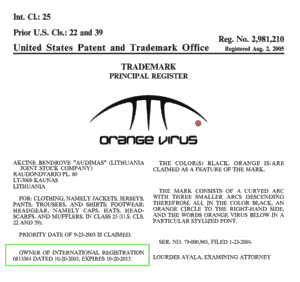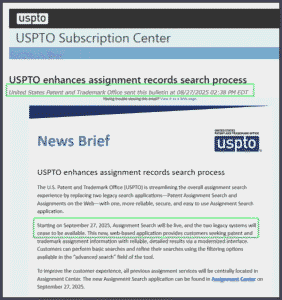
The USPTO has apparently discontinued recognizing the Madrid Protocol status of US trademark registrations. Nobody outside the USPTO knows why. Continue reading “USPTO discontinues recognizing Madrid Protocol status”

Bluesky: @oppedahl.com

The USPTO has apparently discontinued recognizing the Madrid Protocol status of US trademark registrations. Nobody outside the USPTO knows why. Continue reading “USPTO discontinues recognizing Madrid Protocol status”

(Update: every USPTO system relating to assignments is now broken on October 16, 2025, see blog article.)
On August 27, 2025, the USPTO said (quoted at right) that Saturday, September 27, 2025 was the day that the USPTO would shut down the two familiar assignment search systems, forcing users over to a new assignment search function in Assignment Center.
It appears the USPTO has blinked and will postpone this shutdown for about three weeks, until Monday, October 20, 2025. Continue reading “USPTO blinks on shutdown of familiar assignment searches”
“They’ve cut us off at the knees!” is what I heard a few days ago from a USPTO representative in one of the USPTO’s call centers. Continue reading ““They’ve cut us off at the knees!” — USPTO call center employee”
As I reported in an earlier blog article, Trademark Center is broken for trademark applications in which the mark is a logo. USPTO is failing to handle this failure well. Continue reading “USPTO fails to handle system failure well”
January 18, 2025 was the day that the USPTO shut down TEAS for the filing of new US trademark applications. Starting that day, the only way to file a US trademark application has been Trademark Center.
And now, as of a couple of days ago, Trademark Center has been broken for trademark applications in which the mark is a logo (rather than standard characters). The practitioner prepares the application and sends it to the client for review and possible e-signature. The client clicks on the link to review the application, and within seconds, Trademark Center jumps abruptly to its main page. It is impossible for the client to review or e-sign the application.
This was first reported two days ago by an alert trademark practitioner in the E-Trademarks Listerv, which is a community of over a thousand trademark practitioners.
In a previous blog article I described that it seems all of the phones at the USPTO are broken for incoming calls. Here is a practice tip.
If the person’s phone number starts “571-272”, then change the “272” to “273”. This yields a telephone number that is probably that person’s private fax number. You can then send a fax and ask the person to call you back.
From recent discussions on the Patent Practice listserv, it seems that it is impossible just now to place a telephone call to anyone at the USPTO. Continue reading “All USPTO phones seem to be broken”
I am pleased to present the 2024 toteboards:
A January 20, 2025 executive order from President Trump says, in part:
Agency Heads shall take all necessary steps, in coordination with the [administrator of DOGE] and to the maximum extent consistent with law, to ensure [DOGE] has full and prompt access to all unclassified agency records, software systems, and IT systems.
“Agency” is defined in a way that includes the USPTO.
So apparently the Department of Government Efficiency has, or will soon have, full access to all unclassified USPTO records, all USPTO unclassified USPTO software systems, and all USPTO unclassified IT systems.

Three days ago the Office of Personnel Management (“OPM”) sent a blast email to nearly all federal employees (about two million people). (See previous blog article.) It urged the employee to resign from employment by February 6, 2025. Supposedly this would relieve the employee from having to comply with return-to-work requirements, and the employee would get paid through September 30, 2025.
Now I understand that OPM has sent a followup email dated January 30, 2025, quoted above. Reading between the lines, I sense some level of desperation on the part of OPM in this followup email.
Many things puzzle me about the statements in this email message, starting with the first of the FAQs:
Q: Am I expected to work at my government job during the deferred resignation period?
A: No.
I do not see how this could be expected to happen. The OPM guidance to management does not, for example, mandate that the resigning employee would necessarily be relieved of his or her work duties. The guidance says:
Employees who accept deferred resignation should promptly have their duties re-assigned or eliminated and be placed on paid administrative leave until the end of the deferred resignation period (generally, September 30, 2025, unless the employee has elected another earlier resignation date), unless the agency head determines that it is necessary for the employee to be actively engaged in transitioning job duties, in which case employees should be placed on administrative leave as soon as those duties are transitioned.
(January 28 memo, emphasis added.) This merely says “should”, not “must”. Not only that, management might well find that the employee is actively engaged in transitioning job duties. In the USPTO, the hiring and training of a replacement patent examiner or replacement trademark examining attorney has a cycle time measured in months, not weeks or days. Any normal “transitioning” process would likely call for the resigning employee to continue doing work for many months.
We turn to the second FAQ:
Q: Am I allowed to get a second job during the deterred resignation period?
A: Absolutely! We encourage you to find a job in the private sector as soon as you would like to do so. The way to greater American prosperity is encouraging people to move from lower productivity jobs in the public sector to higher productivity jobs in the private sector.
I do not see how this could comply with ethics laws and rules. The OPM guidance says:
Q: Can employees get another job outside of their current employing agency during the period between submission of their resignation and the final resignation date?
A: Nothing in the deferred resignation letter prevents agency employees from seeking outside employment during the period from submittal of their resignation to their final resignation date. Employing agencies should assess what restrictions, if any, exist for employees who have resigned but remain employed (including on administrative leave) by their employing agency.
(January 28 memo.) It is irrelevant that the deferred resignation letter fails to address having two jobs at the same time. What is relevant is that there are ethics laws and rules forbidding (for example) a USPTO patent examiner moonlighting for an inventor who is seeking a patent from the USPTO. Similarly there are ethics laws and rules forbidding (for example) a USPTO trademark examining attorney from moonlighting for a trademark applicant who is seeking a trademark registration from the USPTO. The mere fact of the employee (perhaps) being on administrative leave makes no difference to this ethics analysis.
We turn to the fourth FAQ:
Q: Can I take an extended vacation while on administrative leave?
A: You are most welcome [to] stay at home and relax or to travel to your dream destination. Whatever you would like.
(January 28 memo.) A first puzzler is now it could happen that such an extremely important communication, sent to some two million USPTO employees, would be missing the word “to”. Surely any external communication of this significance would get looked at by a second pair of eyes before the “send” button gets clicked.
But another challenge to this FAQ is the challenge discussed above — that it is not at all clear that a resigning employee would be able to count on not having to do any work during the seven or more months that paychecks continue to be paid.
It is also unclear to me how OPM can be so confident of being able to continue to deliver paychecks in an uninterrupted fashion through September 30, 2025. It is Congress, not any administrative agency, that controls budgets. As of right now, most agencies will run out of money on March 14, 2025.